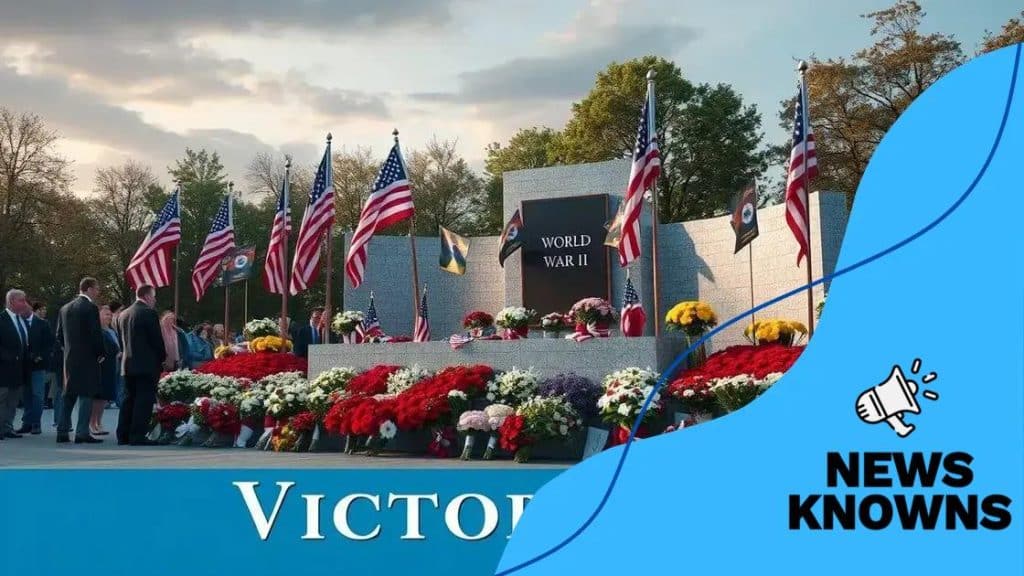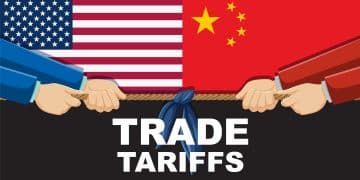Victory Day WWII May 8 2025: A Commemoration Guide

Anúncios
Victory Day, celebrated on May 8, honors the end of World War II, highlighting the importance of remembrance through education, community involvement, and global commemorations to preserve its historical significance.
Victory Day WWII May 8 2025 is not just a date; it’s a powerful reminder of resilience and unity. Have you ever wondered how we can honor those who fought for our freedom? This guide explores meaningful ways to remember and celebrate this important day.
Anúncios
Understanding Victory Day and its significance
Victory Day is a day of remembrance and celebration that honors the end of World War II in Europe. This day, marked on May 8, is significant not only for its historical context but also for its impact on future generations. Understanding the meaning behind this day helps foster appreciation and respect for the sacrifices made during the war.
What Victory Day Represents
Victory Day symbolizes the triumph over tyranny and the restoration of peace. It reminds us of the struggles faced and the resilience shown by so many. This day serves as a powerful reminder of the importance of unity and collaboration in overcoming challenges.
Global Observance
Various countries have unique ways of observing Victory Day. Some notable traditions include:
Anúncios
- Military parades showcasing national pride.
- Memorial services honoring those who lost their lives.
- Community gatherings that bring people together in reflection.
- Educational programs in schools to teach younger generations about the significance of the day.
Understanding these traditions allows us to appreciate the diverse ways different cultures celebrate this important occasion. Events may vary, but the common thread is a respect for history and a commitment to peace.
As we approach May 8, it’s essential to reflect on what this day means. Whether through attending local events or educating ourselves and others, we can keep the spirit of Victory Day alive and meaningful.
Why It Matters Today
Remembering Victory Day reminds us of the cost of freedom. It encourages conversations about peace and the importance of standing against oppression. Each year, as we honor those who fought, we also reaffirm our commitment to a future where such sacrifices are no longer necessary.
Historical events of WWII leading to Victory Day
The events of World War II are crucial to understanding the significance of Victory Day. This day marks the end of a long and brutal conflict that reshaped nations and lives. Exploring these key historical moments gives us insight into why we commemorate this occasion.
The Beginning of the War
The war started in 1939 when Germany invaded Poland. This act drew many nations into a conflict that would last for over six years. The alliances formed during this period were pivotal in shaping the course of the war.
Turning Points in the Conflict
Several key events shifted the momentum of the war:
- The Battle of Stalingrad, where the Soviet Union turned the tide against Nazi Germany.
- The D-Day invasion in 1944, which marked the beginning of the end for German forces in Europe.
- The unconditional surrender of Germany in May 1945.
These battles highlighted both the human cost of war and the tenacity of those fighting for freedom. Each victory brought the world closer to peace.
As the war drew to a close, the liberation of concentration camps revealed the full horror of Nazi atrocities, further solidifying the necessity of remembrance. The messages of courage and sacrifice echo through the decades, reminding us of the stakes involved in global conflict.
On May 8, 1945, the Allies celebrated Victory Day as Germany officially surrendered. This moment represented hope and a renewed commitment to ensuring that such devastation would never occur again.
The Aftermath and Its Significance
The aftermath of the war reshaped international relations. The United Nations was established to promote peace and prevent future conflicts. Remembering these historical events is essential for understanding today’s world and the importance of honoring those who fought.
How different countries celebrate this occasion

Countries around the world celebrate Victory Day in unique and meaningful ways. Each celebration reflects the cultural heritage and historical context of the nation. Understanding these diverse traditions enhances our appreciation for this important day.
Russia’s Grand Parades
In Russia, Victory Day is one of the most significant holidays. The day features huge military parades through Red Square in Moscow. These parades highlight the strength and unity of the nation, showcasing military might and honoring veterans. The event is often accompanied by fireworks, public concerts, and the iconic “Immortal Regiment” march, where citizens carry photographs of their relatives who fought in the war.
European Observances
Many European nations mark Victory Day with remembrance services and ceremonies:
- In France, ceremonies take place at the Arc de Triomphe, where a flame is rekindled in honor of the war dead.
- In the United Kingdom, the day is celebrated as VE Day, with street parties and public gatherings to honor the sacrifices made during the war.
- Germany observes this day with a more reflective tone, focusing on remembrance rather than celebration.
These observances emphasize the diverse ways nations acknowledge their history and the importance of peace.
Global Awareness and Education
In addition to parades and ceremonies, many countries use this opportunity to educate their citizens about the impact of the war. Schools often hold events to discuss the significance of Victory Day, ensuring that younger generations understand the sacrifices made for freedom. This educational aspect is crucial for fostering a sense of responsibility and awareness about history.
Through these celebrations and reflections, different countries come together to honor the legacy of World War II, promoting peace and reconciliation in the present.
Ideas for commemorating Victory Day in 2025
Commemorating Victory Day in 2025 can be a meaningful and engaging experience. It’s an opportunity to honor those who served, reflect on the past, and promote peace. There are countless ways to participate and make this day special.
Community Events
Hosting local events is a fantastic way to bring people together. Consider organizing community gatherings with activities that focus on remembrance. Some ideas include:
- Parades featuring local veterans and military units.
- Ceremonies at local memorials or parks.
- Outdoor movie screenings of documentaries or films about World War II.
These events foster a sense of community and allow for the sharing of stories.
Educational Programs
Schools and community centers can play a key role in educating people about Victory Day. Hosting workshops or lectures can help inform younger generations about the significance of the day. Ideas include:
- Guest speakers who are veterans or historians.
- Workshops where participants can create memorials or art.
- Interactive exhibits that showcase artifacts from the war.
Such programs can deepen understanding and encourage discussions about the importance of peace.
Online Commemoration
In today’s digital age, online commemoration plays a vital role. Social media campaigns can share stories and memories. People can post photos, videos, or messages honoring their loved ones who served during the war.
Additionally, virtual events, such as webinars or online discussions, can reach a wider audience. This approach allows people from different parts of the world to connect and share experiences, magnifying the impact of Victory Day.
By creatively commemorating this day, we can ensure that the sacrifices made during World War II are remembered and appreciated for generations to come.
The role of education in preserving WWII history
Education plays a crucial role in preserving the history of World War II. It ensures that the stories of those who fought, as well as the lessons learned from this global conflict, are passed down to future generations. By integrating WWII history into various educational settings, we can create a deeper understanding of its impact.
Incorporating WWII History in Schools
Many schools are now prioritizing the inclusion of World War II history in their curricula. This can involve:
- History classes that cover significant events and figures of the war.
- Interactive projects that allow students to research and present on various topics related to the conflict.
- Field trips to museums or historical sites that focus on WWII.
These educational methods make history tangible and relatable for students.
Promoting Critical Thinking
Studying WWII encourages critical thinking skills. Students learn to analyze events, understand the motives behind decisions, and evaluate the consequences of actions taken during the war. This approach helps them not just to gather facts, but to engage with history in a meaningful way.
Teachers often facilitate discussions about the ethical dilemmas faced during the war, promoting dialogues that encourage empathy and understanding. Such discussions are crucial in making sense of past conflicts and their implications on current issues.
Digital Resources and Technology
In today’s digital age, technology plays a key role in education. Digital resources, such as online archives and virtual reality experiences, provide students with unprecedented access to primary sources and interactive learning opportunities. For example:
- Virtual tours of concentration camps and museums can educate without glorifying the past.
- Online databases offer documents, photographs, and stories from veterans.
- Educational apps and games can make learning about WWII engaging.
These tools can help bring history to life, making it relevant and impactful for young learners.
Ultimately, the role of education in preserving WWII history cannot be overstated. By fostering curiosity, empathy, and critical thinking, we ensure that the sacrifices made during the war are not forgotten.
FAQ – Frequently Asked Questions about WWII History Education
Why is education important for preserving WWII history?
Education helps future generations understand the sacrifices made during WWII and promotes critical thinking about the impact of war.
What are effective methods for teaching WWII history in schools?
Using interactive projects, guest speakers, and multimedia resources can make learning about WWII engaging and meaningful.
How can technology enhance the understanding of WWII history?
Technology offers access to virtual tours, online resources, and interactive materials that enrich the educational experience.
What role do community events play in WWII remembrance?
Community events foster a sense of unity and respect, allowing individuals to honor veterans and learn about the significance of WWII actively.





